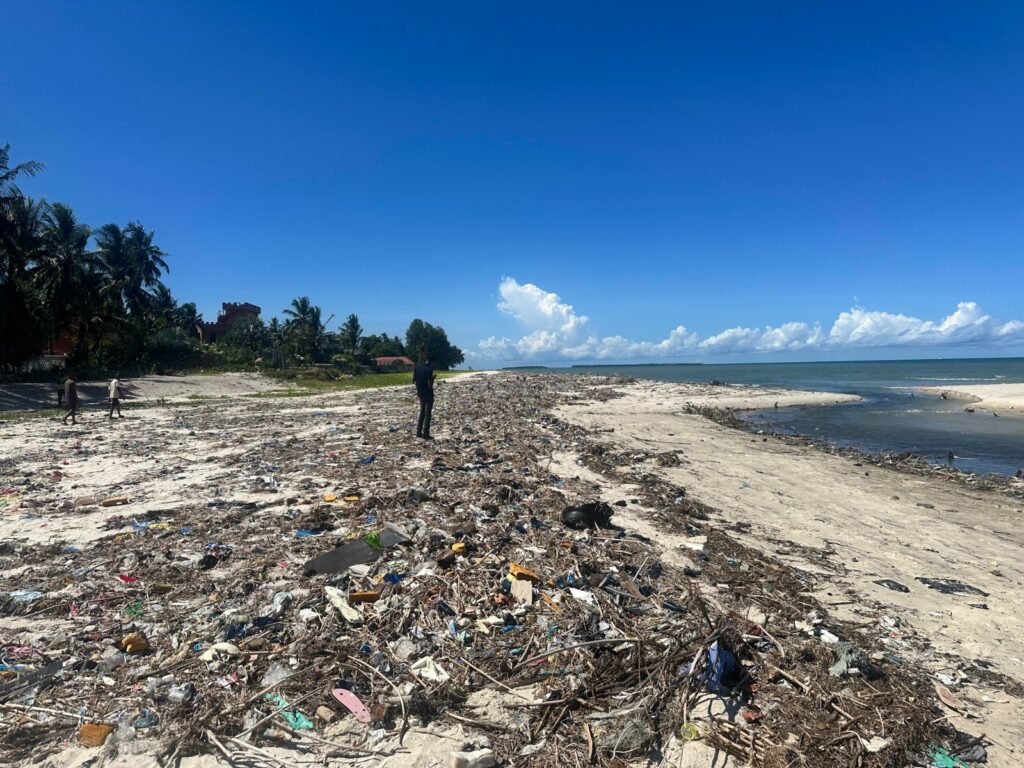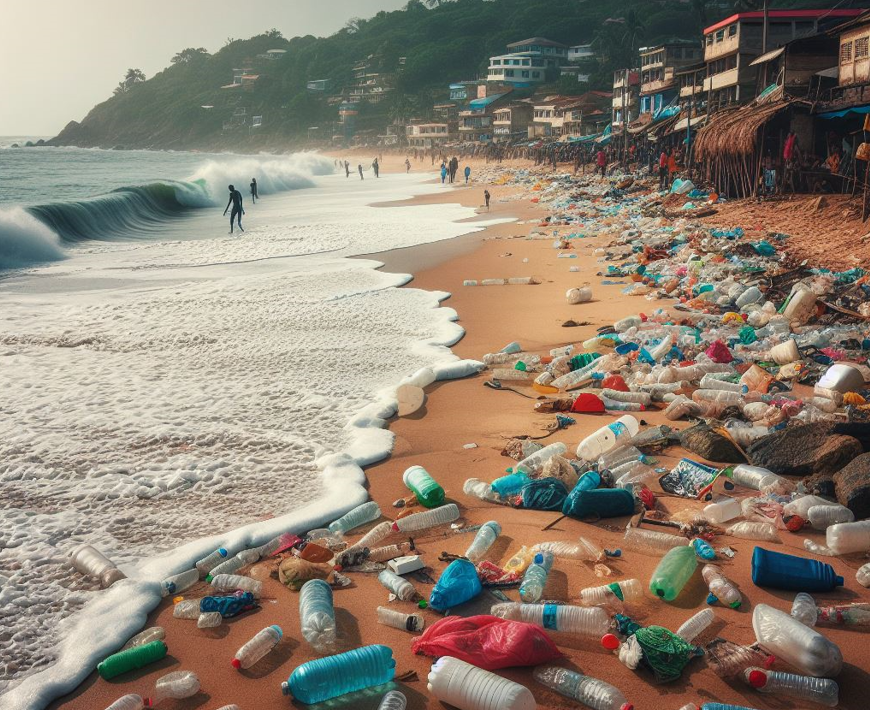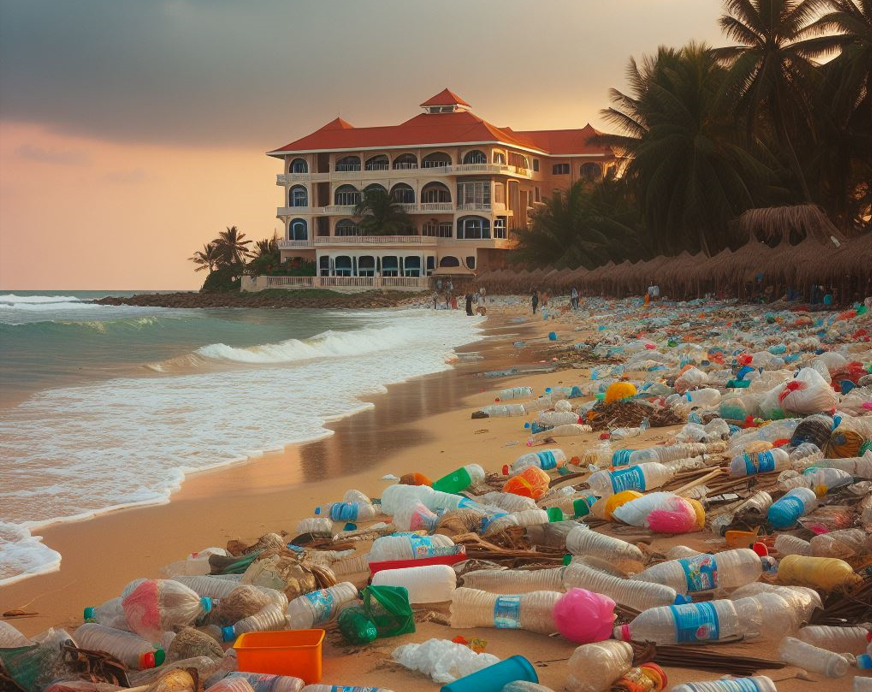Despite significant efforts by the government and environmental stakeholders to maintain cleanliness on the beaches of Dar es Salaam, the situation remains contentious, adversely impacting small-scale investors in these areas.
A report by the International Union for Conservation of Nature (IUCN) on plastic and coastal communities in the country in 2021 indicates that while 40 percent of the waste is collected, a staggering 96 percent is not properly managed, leading to its disposal in ponds, seas, and lakes.
During a visit to Rainbow Beach at Bezi Beach and Beachmavi in Msasani, Dar es Salaam, Habitat found plastic waste scattered around, with business owners lamenting how this affects their operations.
Business Owners’ Woes
Ramadhani Juma, a beverage vendor at Rainbow Beach, stated that his business has declined compared to six years ago when he started due to people avoiding the beach because of its uncleanliness. He listed prevalent types of waste in the area including sanitary towels, diapers, bottles, plastic bags, and even hospital waste like syringes and drip bags, posing a danger to the environment and human health.
“In the past, people used to pass by this area to enjoy the breeze by the beach and would buy drinks. Nowadays, there are no people because the beach smells of dirty water and plastic waste is everywhere,” he said.
Juma, a father of three, mentioned that when he started his business, he used to sell two crates of soda per day, but now he barely sells half a crate.
Zuhura Magimbe, a food vendor at Beachmavi, echoed similar sentiments, stating that the number of customers has significantly decreased, with only fishermen frequenting the area.

She said that when she started her business in 2015, she used to sell up to five kilograms of rice and three kilograms of maize flour per day as various people visited the area, but now she only sells two kilograms of rice and two kilograms of flour.
“People don’t come here anymore like they used to. Waste has increased, especially during the rainy season, and there are also drainage systems that discharge dirty water in this area, making the sea water murky and foul-smelling,” she said.
Another food vendor, Jacline Joseph, mentioned one of the challenges she faces in her business is customers being selective with vegetables, with many refusing to eat fish, believing it is unsafe due to the beach’s appearance.
“Many customers, especially those passing by, come here and say if you don’t have other vegetables, that’s fine, but no fish. When you ask them why, they say those dirty sea waters are unseen, those fish won’t be safe for our health,” she said.
Caroline Ngoda, a Street Government Representative and Chairperson of the Environmental Committee at Mbezi Beach A, said that the dirt in the area is contributed by the Mbezi River and other rivers in the city, which discharge water into the ocean, bringing along the waste.
She said they have a routine of cleaning the beaches regularly in collaboration with stakeholders, but shortly after, the waste returns, especially during the rainy season.
She urged the government to install filters in the rivers that discharge water to prevent waste from entering the ocean, which would contribute to keeping the areas clean.

Stakeholders Speak Out
Fredy Kwezi, Founder and Chairman Tanzania Sustainable Development Initiative (TSDI), said despite the significant efforts by environmental stakeholders to clean up the beaches, the situation remains unchanged, which is discouraging.
He said that if the beaches were clean, they would be a good source of revenue for the government and would benefit small-scale traders in the area, urging the government to prioritize improving cleanliness in the area.
“I feel even this Msasani beach has been named Beach Mavi due to the sewage water from those three pipes there, which damages the image and status of this area,” he said.
Way Forward
Sarah Pima, Director of the Humanity and Environment Development Institute (HUDEFO), advises the community to follow the Environmental Law of 2004, Section 106, which prohibits anyone from polluting or allowing others to do so.
She also reminded government leaders, starting from the grassroots level, to implement the Environmental Law of 2004, Section 1 (a), which directs them to ensure that all waste is classified and analyzed from the family level where it is generated.
She said that by doing so, it would help prevent the indiscriminate disposal and spread of waste, especially plastic waste, on the streets, which leads to entering water drains and ending up in the ocean.



✔️꽁타✔️ggongta.com,꽁머니 커뮤니티,꽁머니이벤트 꽁머니 환전 What i do not realize is in fact how you are no longer actually much more wellfavored than you might be right now Youre very intelligent You recognize thus considerably in relation to this topic made me in my view believe it from numerous numerous angles Its like men and women are not fascinated until it is one thing to do with Lady gaga Your own stuffs excellent All the time handle it up
Yapmanız gereken bir hesap oluşturmak, “depozito yok” bonus kodunu kullanmak ve oynamak için parayı kullanmak. Şartlar ve koşulları okuduğunuzdan emin olun, çünkü bu durumda bazı oyunlara izin verilmeyebilir ve para yatırma bonusu kapsamında olmayacaktır. Yatırdığınız paralardan herhangi birini kullanmadan önce bu bonusu oynamanız gerekecektir. İster masa oyunları ister casino slotları oynamayı seviyor olun, bir dizi heyecan verici varyasyon arasından seçim yapabilirsiniz. Starlight princess demo, oyunculara çeşitli oyun özellikleri ve bonuslar sunuyor. Oyun içinde serbest dönüşler, wild semboller, scatter semboller ve bonus oyunlar gibi birçok heyecan verici özellik bulunuyor. Bu özellikler, oyuncuların kazanma şansını artırırken oyun deneyimini daha da keyifli hale getiriyor.
https://mschulte.comey.com/bigger-bass-bonanza-incelemesi-turkiye-oyunculari-icin-eglenceli-ve-kazancli-bir-slot-deneyimi/
Eğer siz de yıldızlar arasında bir maceraya atılmak ve büyük kazançlar elde etmek istiyorsanız, Betvast’ta Starlight Princess’i denemelisiniz. Bu büyülü oyun, size unutulmaz bir deneyim sunmak için tasarlanmıştır. Yıldızlar arasında kazanmak için Betvast’a bir göz atın. İyi şanslar! Slot oyunları dünyasında, temalarıyla ve hikayeleriyle oyuncuları etkileyen birçok oyun var. Ancak, bazı oyunlar var ki, sadece oynanışıyla değil, aynı zamanda sunduğu atmosfer ve tema ile de fark yaratıyor. Bu oyunlardan biri de Starlight Princess. Bu yazıda, Starlight Princess slot oyununun büyülü dünyasına dalacak, oyunun nasıl oynandığından nereden oynanacağına kadar tüm detayları keşfedeceğiz. Her slot oyunu gibi, Starlight Princess’te de oyun stratejileri kullanılabilir. Ancak unutmayın ki slot oyunları tamamen şansa dayalıdır. Oyunun sonuçları rastgele oluşur, bu nedenle kesin bir strateji yoktur.